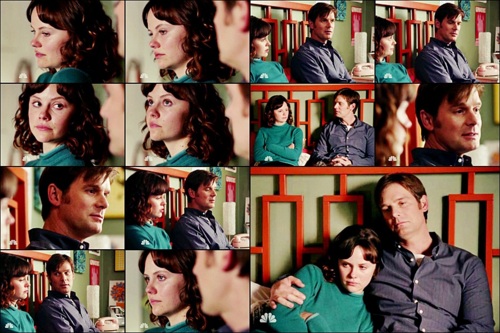
1. A pair of terrific book reviews have appeared in The NY Times over the last couple weeks, the first being Generation X author Douglas Coupland‘s inspiring riff on Hari Kunzu’s opus, Gods Without Men, and the exciting new genre it epitomizes (“Translit”). Ironically enough, he makes a number of Twitter-ready observations:
[We are living in a] “state of possibly permanent atemporality given to us courtesy of the Internet. No particular era now dominates. We live in a post-era without forms of its own powerful enough to brand the times. The zeitgest of 2012 is that we have a lot of zeit but not much geist.”
Then there’s you-know-who’s review of Alain de Botton’s Religion for Atheists, which we’ve covered at some length before. Brooks’ conclusion, where he zeroes in on the inescapable problem with de Botton’s (ultimately rather patronizing) project, is another jawdropper:
[Religious writers like C.S. Lewis and Augustine] don’t coolly shop for personal growth experiences like someone at the spiritual mall. They find themselves enmeshed in paradoxes of a richness unimaginable before they became entangled in them — that understanding comes after love, that one achieves fullness by surrendering self, that as you approach wisdom you are swept by a sensation that you have been suppressing all along, and all you need do is release. Augustine’s great biographer Peter Brown writes, “The healing process by which love and knowledge are reintegrated is made possible by an inseparable connection between growing self-determination and dependence on a source of life that always escapes self-determination.”…
There’s something at stake in these accounts, a person’s whole destiny and soul. The process de Botton is recommending is more like going on one of those self-improving vacations. If all his advice were faithfully followed, we’d be a collection of autonomous individuals seeking a string of vaguely uplifting experiences that might perhaps leave a sediment of some sort of spiritual improvement.
2. Also in The NY Times, a very poignant account of one man’s grief following his wife’s death appeared last week’s installment of Modern Love, “Moving Through Grief, One Chair at a Time,” ht VH:
As I considered the many possessions I owned and couldn’t let go of, I came to realize the inertia was all about grief. I don’t think grief has a half-life. I think it is always there, undiminished, and it merely gets covered over by other experiences. My stubbornly holding on to these examples of Judy’s taste was a manifestation of my grief.
3. On a more upbeat note, I’m not sure how we missed the Freakonomics blogpost, “Why Economics Fall Down in the Face of Fatherhood” by self-described “committed neoclassicist economist” Justin Wolfers, when it appeared last Friday. If it sounds curiously like a conversion story, that’s because it sort of is. Admist the well-documented wreckage of so many child-father relationships these days, the piece doubles as a deeply encouraging reminder of what it might mean to call God father, or at least, for him to call us children, ht SZ:
I had always believed in the analytic self; I was rational, calculating, and tried to make smart decisions. Of course real people don’t use math, but I figured that we’re still weighing costs and benefits just as our models say. Or at least that was my understanding of the world.
Today, I’m not so sure. My feelings toward my daughter Matilda aren’t easily expressed in analytic terms. I struggle to express it, just as I struggle to understand it. I think about my daughter, and I smile. Her laugh is the greatest joy, and it thrills me that she shares it with me. I’m fiercely protective of her, love (as you can tell) talking about her, and she’s central not only to my life, but to who I am.
4. In the theologosphere, two must-reads: NYC Conference speaker Michael Horton has been tackling the close-to-home topic of Antinomianism over at The White Horse Inn Blog with trademark acuity and insight. And earlier today, Tullian Tchividjian published part one of a new series unpacking the distinction between “Law and Gospel” (which he makes about as clear as one possibly could: “The law says, ‘Do!’, but the gospel says, ‘Done!’). The hymn from Ralph Erskine he includes is devastating. Elsewhere on the Interweb, in the you-know-you’re-reaching-people-when department, the hilarious new FakeTullian Twitter account issued the following extremely clever parody: “Discussing Valentine’s Day gifts with my wife. I told her it’s not about what I buy for her; it’s about what she has already bought for me.” Also in the laugh-at-ourselves department, there’s Relevant Magazine’s “‘Shoot’ Christians Say”, ht AZ.
5. The Atlantic gives us the, um, HIStory of Michael Jackson’s domestically underrated (and all-around genius) 1997 smash, “Blood on the Dance Floor.” And over at The A/V Club, Noel Murray offers some truly wise thoughts on “Devo’s Paradox: Why Some Art Can’t Be Appreciated in its own Time.” Oftentimes, as Murray points out, reviews say more about the reviewer and their pre-judgments than the work in question – which would seem to support Jonathan Haidt’s assertion that intuitions precede reasoning. If you’re the sort of person who finds the Law of Hip increasingly ludicrous the older you get, do yourself a favor.
6. There’s this slice of brilliance:
7. At the movies, with the notable exception of David Denby in The New Yorker (who calls it “prime example of commercial hypocrisy”), it sounds like The Hunger Games delivers the thrills in a satisfying but not book-replacing way – which is probably the best case scenario. The final line of Manohla Darghis review in the Times is remarkably poetic:
“Unlike those American Adams who have long embodied the national character with their reserves of hope, innocence and optimism, Katniss springs from someplace else, a place in which an American Eve, battered, bruised and deeply knowing, scrambles through a garden not of her making on her way to a new world.”
Meanwhile, Terence Davies’ new adaptation of Terence Rattigan’s play, “The Deep Blue Sea,” has been getting raves. David Denby writes in The New Yorker:
[Rachel Weisz’s] Hester is desperately needy, almost pathetic, close to suicide. [Her love interest Freddie] can’t handle her demands… Sex is the subtext of everything that happens, yet this may be one of the least erotic movies ever made. It’s stern and noble, very much in the Rattigan spirit.
8. A delightful little rundown over at Brain Pickings of some of the notes and complaints that monks scribbled in the pages of illuminated manuscripts. Personal favorite is probably: “St Patrick of Armagh, deliver me from writing,” ht JD.
9. Finally, some thought-provoking weekend reading about compulsion and compassion on Slate, “I Hate Myself for Loving Hoarders“ and “How Do I Stop Myself From My Daughter’s Schoolyard Problems?”
Bonus Track: Wes Anderson’s new commercial is a masterpiece, no?
[youtube=www.youtube.com/watch?v=HMnlfPvd5AI&w=600]
[youtube=http://www.youtube.com/watch?v=ql1hek8q8-g&w=600]
[youtube=www.youtube.com/watch?v=mAbv7KlUQSQ&w=600]

COMMENTS
Leave a Reply













